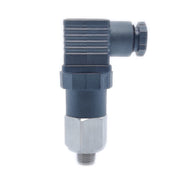As technology advances, more and more devices are being equipped with pressure sensors to measure various parameters. However, it's important to note that the temperature can have a significant impact on the accuracy of these sensors. That's where temperature compensation comes into play. In this guide, we'll discuss pressure sensor temperature compensation, with a focus on XIDIBEI pressure sensors.
What is Pressure Sensor Temperature Compensation?
Pressure sensors are designed to measure the pressure of a fluid or gas. However, the pressure reading can be affected by changes in temperature, due to the thermal expansion and contraction of the sensing element. To ensure accurate measurements, pressure sensors are often equipped with temperature compensation mechanisms.
Temperature compensation can be achieved in several ways, depending on the type of pressure sensor. For instance, some sensors may use a second temperature sensor to measure the temperature of the sensing element, and then adjust the output signal accordingly. Other sensors may use internal circuitry to compensate for temperature changes.
XIDIBEI Pressure Sensors
XIDIBEI is a reputable brand that produces high-quality pressure sensors. Their sensors are designed with temperature compensation mechanisms to ensure accurate readings in various temperature conditions.
XIDIBEI's pressure sensors use a proprietary compensation algorithm to adjust the output signal based on the temperature of the sensing element. This ensures that the sensor can provide accurate readings even in extreme temperature conditions. Additionally, XIDIBEI's sensors are designed to have a low temperature coefficient of sensitivity, which means that the output signal is minimally affected by temperature changes.
Factors to Consider for Pressure Sensor Temperature Compensation
When choosing a pressure sensor, it's important to consider several factors related to temperature compensation. These include:
-
Temperature range: The temperature range in which the sensor will operate should be considered when selecting a sensor. Ensure that the sensor's temperature compensation mechanism can handle the expected temperature range.
-
Accuracy requirements: The required accuracy of the pressure readings should also be considered. More accurate sensors may require more sophisticated temperature compensation mechanisms.
-
Sensor type: Different types of pressure sensors may have different temperature compensation mechanisms. Ensure that the chosen sensor type is suitable for the intended application.
Conclusion
Pressure sensor temperature compensation is a crucial aspect of accurate pressure measurements. XIDIBEI pressure sensors are designed with high-quality temperature compensation mechanisms to ensure accurate readings in various temperature conditions. When selecting a pressure sensor, it's important to consider factors such as the temperature range, required accuracy, and sensor type. By following these guidelines, you can select a pressure sensor that is best suited for your application.



Leave a comment